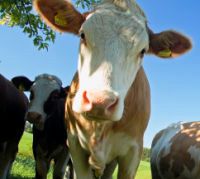

Scientists warn that attempts to solve the climate crisis by cutting carbon emissions from only cars, factories and power plants are doomed to failure.
A leaked draft of a Report on climate change and land use, which is now being debated in Geneva by the Intergovernmental Panel on Climate Change (IPCC), states that it will be impossible to keep global temperatures at safe levels unless there is also a transformation in the way the world produces food and manages land.
The Report warns that:
The Report warns that these problems are likely to get worse, stating, "climate change exacerbates land degradation through increases in rainfall intensity, flooding, drought frequency and severity, heat stress, wind, sea-level rise and wave action".
It is a bleak analysis of the dangers ahead and comes when rising greenhouse gas emissions have made news after severe events, including:
The IPCC has warned that rises greater than 1.5°C risk triggering climatic destabilisation - while those higher than 2°C make such events even more likely. Bob Ward, policy director at the Grantham Research Institute on Climate Change and the Environment, said, “we are now getting very close to some dangerous tipping points in the behaviour of the climate – but as this latest leaked report of the IPCC’s work reveals, it is going to be very difficult to achieve the cuts we need to make to prevent that happening”.
The Report emphasises that land will have to be managed more sustainably so that it releases much less carbon than at present. This means:
The Report also proposes a major shift towards vegetarian and vegan diets, that the "consumption of healthy and sustainable diets, such as those based on coarse grains, pulses and vegetables, and nuts and seeds … presents major opportunities for reducing greenhouse gas emissions".
It adds that policies need to include:
Nations are scheduled to meet in late 2020, probably in the UK, at a key conference where delegates will plan how to achieve effective zero-carbon emission policies over the next few decades.